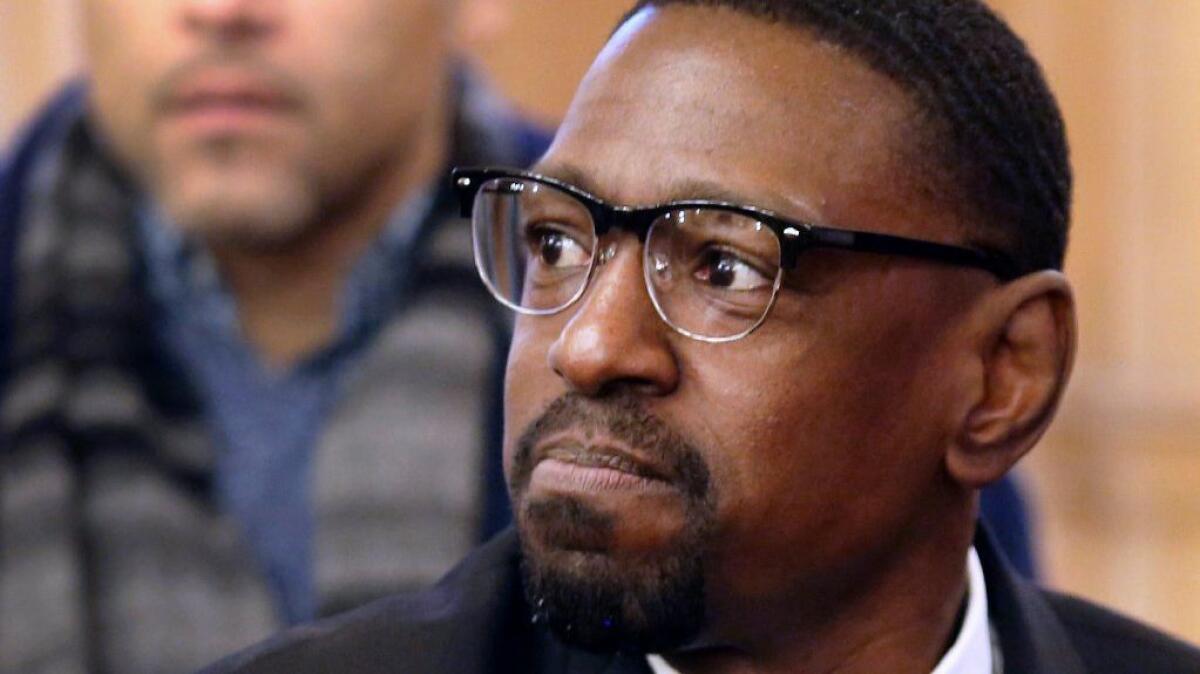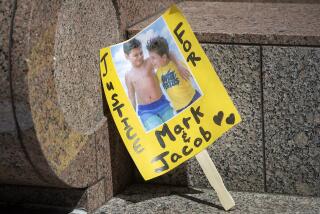Op-Ed: John Grisham: Eight reasons for America’s shameful number of wrongful convictions

It is too easy to convict an innocent person.
The rate of wrongful convictions in the United States is estimated to be somewhere between 2% to 10%. That may sound low, but when applied to a prison population of 2.3 million, the numbers become staggering. Can there really be 46,000 to 230,000 innocent people locked away? Those of us who are involved in exoneration work firmly believe so.
Millions of defendants are processed through our courts each year. It’s nearly impossible to determine how many of them are actually innocent once they’ve been convicted. There are few resources for examining the cases and backgrounds of those claiming to be wrongfully convicted.
Once an innocent person is convicted, it is next to impossible to get them out of prison.
Once an innocent person is convicted, it is next to impossible to get them out of prison. Over the past 25 years, the Innocence Project, where I serve on the board of directors, has secured through DNA testing the release of 349 innocent men and women, 20 of whom had been sent to death row. All told, there have been more than 2,000 exonerations, including 200 from death row, in the U.S. during that same period. But we’ve only scratched the surface.
Wrongful convictions happen for several reasons. In no particular order, these causes are:
Bad police work
Most cops are honest, hard-working professionals. But some have been known to hide, alter or fabricate evidence, lie on the witness stand, cut deals with snitches in return for bogus testimony, intimidate and threaten witnesses, coerce confessions or manipulate eyewitness identifications.
Prosecutorial misconduct
Most prosecutors are also honest, hard-working professionals. But some have been known to hide exculpatory evidence, encourage witnesses to commit perjury, lie to jurors, judges and defense lawyers, use the testimony of bogus experts or ignore relevant evidence beneficial to the accused.
False confessions
Most jurors find it impossible to believe that a suspect would confess to a serious crime he didn’t commit. Yet the average citizen, if taken to a basement room and subjected to 10 consecutive hours of abusive interrogation tactics by experienced cops, might be surprised at what they would say. Of the 330 people who were exonerated by DNA evidence between 1989 to 2015, about 25% gave bogus confessions after lengthy interrogations. Almost every one recanted soon after.
Faulty eyewitness identification
More often than not, those who witness violent acts have trouble accurately recalling the facts and identifying those involved. Physical and photo lineups may exacerbate the problem because police manipulate them to focus suspicion on favored suspects.
Jailhouse snitches
In every jail there is a career criminal staring at a long sentence. For leniency, he can be persuaded to lie to the jury and describe in great detail the confession overheard from the accused, usually a cellmate. If he performs well enough on the stand, the authorities might allow him to walk free.
Bad lawyering
Those accused of serious crimes rarely have money. Many are represented by good public defenders, but too many get stuck with court-appointed lawyers with little or no experience. Capital cases are complex, and the stakes are enormous. All too often, the defense lawyers are in over their heads.
Sleeping judges
Judges are supposed to be impartial referees intent on ensuring fair trials. They should exclude confessions that are inconsistent with the physical evidence and obtained by questionable means; exclude the testimony of career felons with dubious motives; require prosecutors to produce exculpatory evidence; and question the credentials and testimony of all experts outside the presence of the jury. Unfortunately, judges do not always do what they should. The reasons are many and varied, but the fact that many judges are elected doesn’t help. They are conscious of their upcoming reelection campaigns and how the decisions they make might affect the results. Of those judges who are appointed rather than elected, the majority are former prosecutors.
Junk science
Over the past five decades, our courtrooms have been flooded with an avalanche of unreliable, even atrocious “science.” Experts with qualifications that were dubious at best and fraudulent at worst have peddled — for a fee, of course — all manner of damning theories based on their allegedly scientific analysis of hair, fibers, bite marks, arson, boot prints, blood spatters and ballistics. Of the 330 people exonerated by DNA tests between 1989 and 2015, 71% were convicted based on forensic testimony, much of which was flawed, unreliable, exaggerated or sometimes outright fabricated.
Brandon L. Garrett, a professor of law at University of Virginia, has studied nearly all of the trial transcripts from wrongful convictions later exposed by DNA-based exonerations. “There is a national epidemic of overstated forensic testimony, with a steady stream of criminal convictions being overturned as the shoddiness of decades’ worth of physical evidence comes to light,” he wrote last year in The Baffler. “The true scope of the problem is only now coming into focus.”
An excellent new book by Radley Balko and Tucker Carrington, “The Cadaver King and the Country Dentist,” chronicles the story of two of the most brazen experts ever allowed in a courtroom. Steven Hayne was a controversial forensic pathologist who once boasted of performing more than 2,000 autopsies in a single year. His sidekick, Michael West, was a small-town dentist who assumed the role of an expert in many other fields. Together they tag-teamed their way through rape and murder trials in Mississippi and Louisiana, accumulating an impressive string of convictions, several of which have been overturned. Some are still being litigated. Many others, however, seem destined to stand.
It’s a maddening indictment of America’s broken criminal justice system, in which prosecutors allowed — even encouraged — flawed forensic testimony because it was molded to fit their theories of guilt. Over two decades, elected judges permitted these two professional testifiers to convince unsophisticated jurors that science was on the side of the state.
The atrocities that occurred in Mississippi and Louisiana aren’t specific to one time and place. The medical examiners, police officers, prosecutors, judges and others who hold sway over our criminal justice system around the country have largely failed to deliver justice. We must do better.
John Grisham is a writer, attorney, politician and activist best known for his popular legal thrillers. This piece was adapted from the foreword of “The Cadaver King and the Country Dentist.”
Follow the Opinion section on Twitter @latimesopinion or Facebook
More to Read
A cure for the common opinion
Get thought-provoking perspectives with our weekly newsletter.
You may occasionally receive promotional content from the Los Angeles Times.






